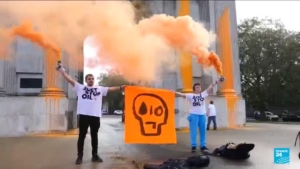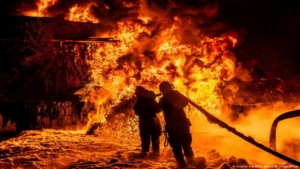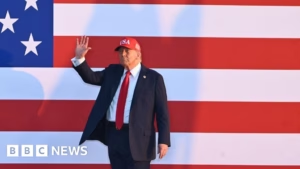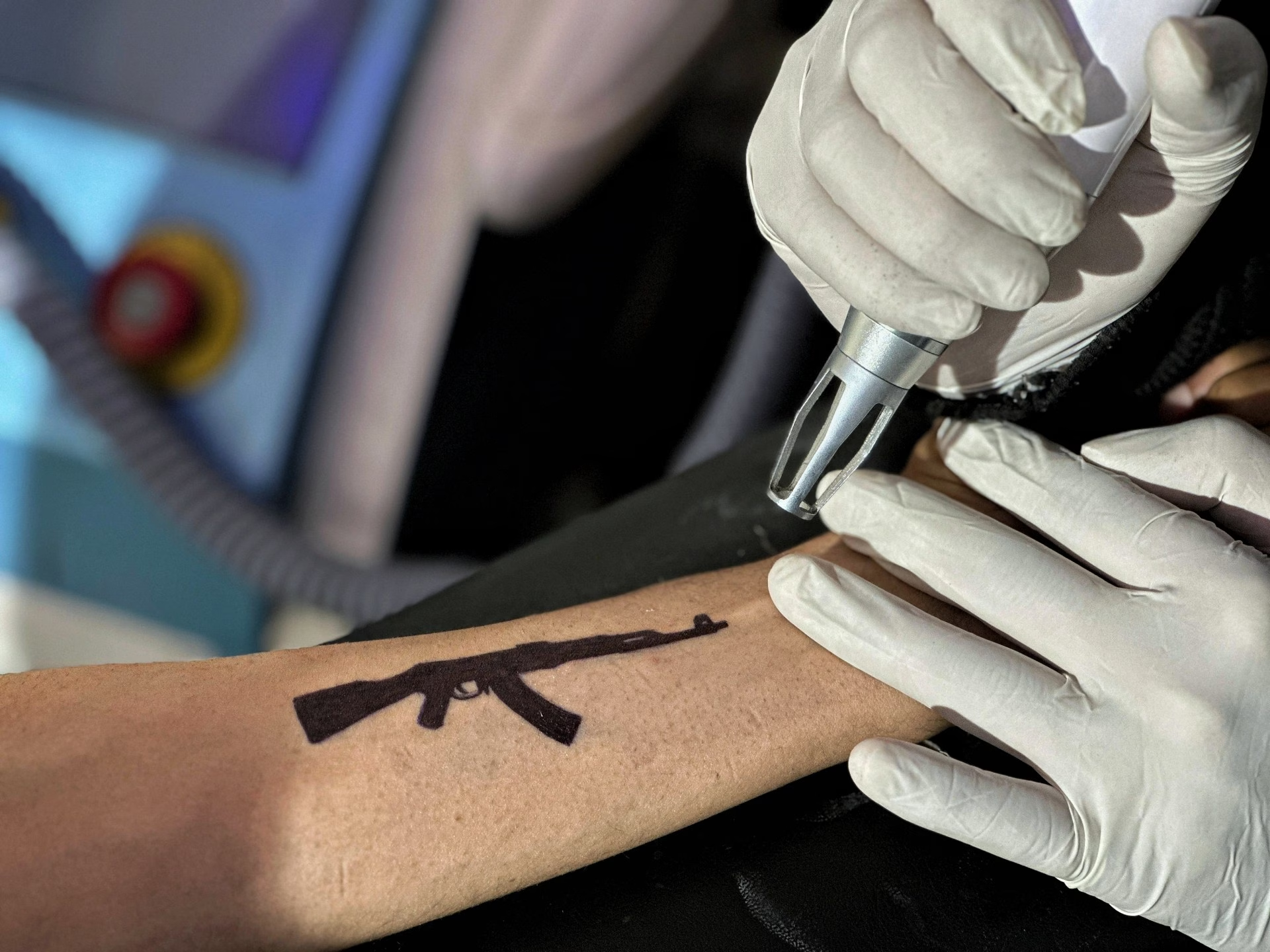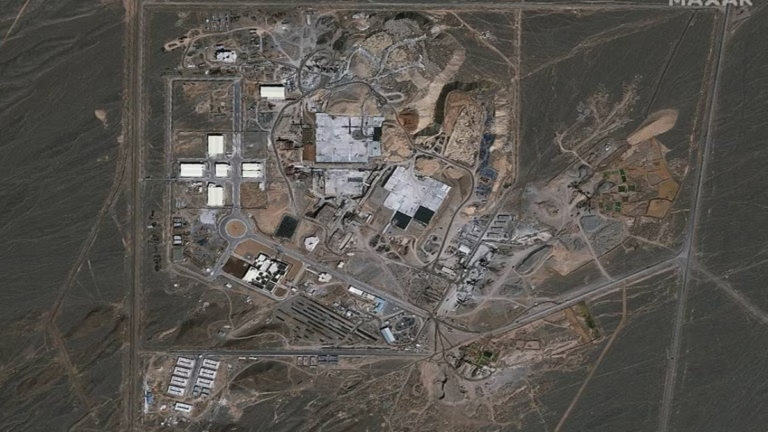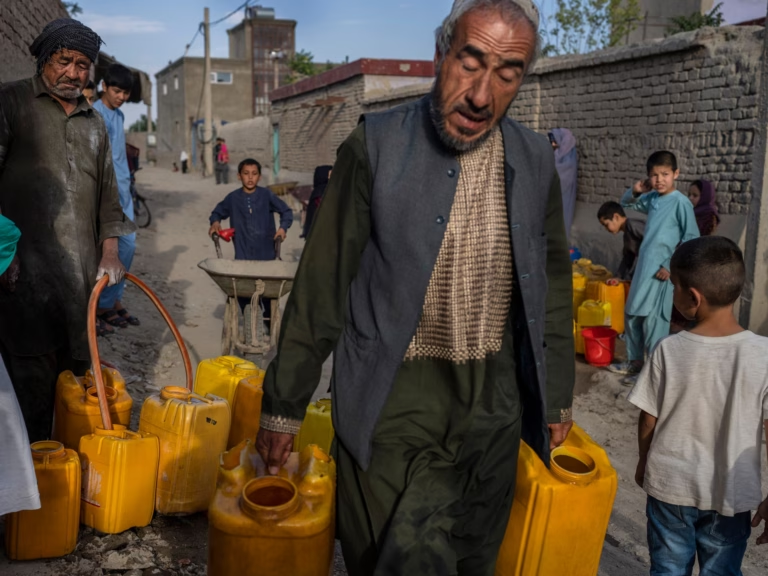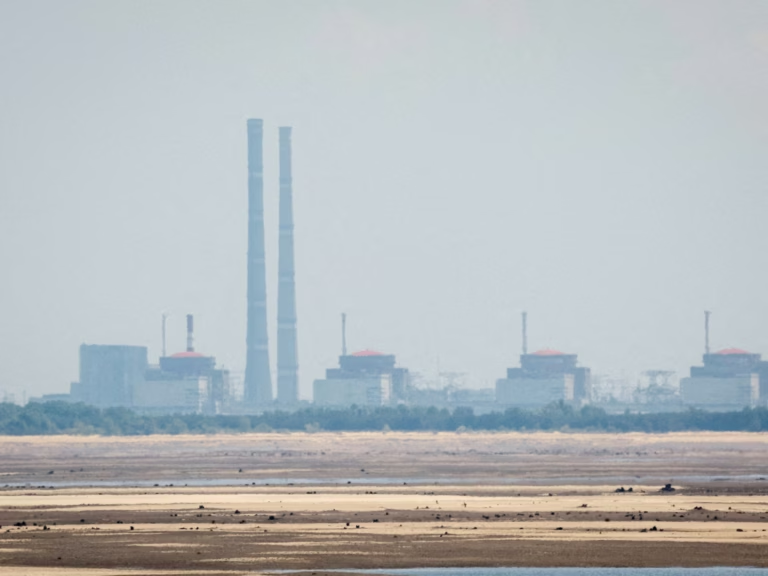<
div aria-live=”polite” aria-atomic=”true”>Srinagar, Indian-administered Kashmir – Joined by Al Jazeera in a discreet laser clinic situated in Srinagar, the largest city in Indian-administered Kashmir, Sameer Wani extends his arm for a treatment that is causing the fading ink on his skin to disappear.
The once defiant ink – “Azadi” (freedom in Urdu) – symbolizing resistance against India’s rule, is being carefully erased by laser technology. A significant emblem of his former rebelliousness has transformed into a burden Sameer is keen to cast away.
Observing the removal of the tattoo, Sameer, who is 28, is reminded of a particular day that has stayed with him. It was the moment during a bike ride with a friend when they were halted at an Indian security forces checkpoint.
While being frisked, an officer pointed to the tattoo on Sameer’s arm and inquired, “What does this signify?”
Sameer’s heart raced as he relayed to Al Jazeera, his voice laden with the weight of memory, “I was fortunate he could not decipher Urdu.” “It was a close brush,” he says. “I instantly recognized this ink could slice open something grave.”
In his youth, Sameer confesses, the tattoo was a “symbol of strength, of standing up for something”.
“But now, I perceive it as a misjudgment. It no longer encapsulates who I am,” he declares. “It isn’t worth the risk and it’s not worth clinging to something that could mar my future.”
Sameer’s journey reflects a broader trend among young Kashmiris who are choosing to erase tattoos that once represented their political affinities or deeply-held ideologies. Tattoos that were once worn with honor are now removed in growing numbers across the region – this movement occurring silently and without attention.
The momentum for eradicating tattoos was already underway, but it escalated following the near-conflict between India and Pakistan – countries that have been at odds over Kashmir since gaining independence in 1947.
India accuses Pakistan of backing an armed uprising that erupted in Indian-administered Kashmir in 1989. Pakistan denies such allegations, supporting the diplomatic cause of Kashmir’s separatist groups.
Two weeks following the incursions and skirmishes that almost precipitated war – marked by India’s pre-dawn strikes on perceived “terror camps” and a consequent exchange of fire – the international community held its breath as Pakistan launched an operation amid the escalating tensions.
Subsequently, peace hath remained tenuous in Indian-administered Kashmir, where a crackdown by Indian forces has instilled a pervasive fear. Homes of suspected rebels have been razed, numerous raids executed, and over 1,500 individuals arrested in the period since the conflict.
Tensions force youth into hiding and erasure
Amid this strained atmosphere, many Kashmiri youth feel exposed and more at risk from scrutiny, even over the most private forms of expression.
“Every incident between India and Pakistan is felt acutely – quite literally,” reveals Rayees Wani, a 26-year old inhabitant of the Shopian district, speaking to Al Jazeera.
‘‘Whenever something transpires, we sense it visceral – quite literally’
Comments about an uncomfortable experience at checkpoints after the conflict have led Rayees to contemplate removing his commemorative tattoo of the Hurriyat leader Syed Ali Shah Geelani’s name. The Hurriyat is a collective of pro-freedom factions in Indian-administered Kashmir.
“Even among friends, the questions are straightforward and uncomfortable,” Rayees shares. “The media, police, and, eventually, the neighbors gaze upon you in a different manner.”
“I simply wish people understood that a tattoo does not define allegiance or character. We strive to exist, not furnish explanations every day. Promptly, I hope to excise it,” Rayees adds.
Arsalan, 19 from Pulwama has similarly committed to a session for tattoo removal, preferring anonymity due to fears of repercussions from the authorities.
“Individuals with visible tattoos, particularly those hinting at past political alignments, are now cautiously contemplating they might be profiled, interrogated – or worse,”
Interestingly, tattoo culture in Kashmir is not necessarily diminishing. Studios, frequented chiefly by individuals aged between 22 and 40, who patiently wait in queues to get inked, remain bustling. However, the prevailing designs have shifted; these youths favor minimalist and nature-inspired creations, names, or meaningful quotes in sleek fonts.
Kashmiri individuals eliminating tattoos frequently express it as part of their personal growth and transformation.
“For me, it was a point of audacity,” Irfan Yaqoob of Baramulla district, recounts to Al Jazeera. Now 36, Yaqoob inked the name of a fallen rebel onto his left arm as a teenager.
“Back then, it represented valor. But now, examining it, I realize how much I have grown. Life has evolved, and hence have I. I have a family, a career with varied priorities. I do not want my past to preside over or instigate present turmoil. Hence, my decision to remove it. It is not about disgrace. It’s about metamorphosis,” he clarifies.
Multiple factors motivate tattoo removal
It’s not solely the security forces that have motivated the surge among Kashmiris to remove their tattoos.
For some, the tattoos have evolved into painful reminders of a chaotic past. For others, the tattoos fashioned stumbling blocks, particularly when trying to advance professionally or realign the inscriptions on their bodies with their personal convictions.
Anas Mir, a resident of Srinagar, had a sword tattoo inscribed with “Azadi” that he had recently removed.
“Folks don’t directly state why they’re eliminating tattoos. I removed mine merely due to my family’s pressure,” the 25-year-old claims.
“Determining what sort of tattoo I should have is my decision. No one ought to be judgmental about it. If someone had an AK-47 or political tattoo, that was their prerogative. The authorities or government shouldn’t intervene. And yes, the nature of tattoos is subject to change,” Anas adds.
Another significant reason for the removal of tattoos is religion. An individual with a tattoo, particularly one with religious or political inscriptions, can contravene Islamic teachings in a predominantly Muslim region.
Faheem, a 24-year-old, recounted how he had a Quranic verse tattooed on his back during adolescence.
“At that point, I deemed it as an act of faith. But subsequently, I recognized that tattoos — especially those with sacred verses — are not encouraged [in Islam]. It began to deeply trouble me. I felt at fault each time I offered namaz [prayers] or ventured to the mosque. That guilt stayed with me. Removing it was my way of reconciling with myself and my faith,” he explains, remaining anonymous for security reasons.
Religious advisors in Srinagar confirm that some individuals visit them to ask if tattoos constitute a breach of their prayers or faith. While many are advised against dwelling on past actions, they are encouraged to take steps that align them closer to their faith.
“It’s about development and comprehension. When someone recognizes that a former action doesn’t correspond with their beliefs anymore, and takes steps to rectify it, that’s indicative of maturity, not shame,” noted Ali Mohammad, a Srinagar-based religious scholar.
Job stability is another factor propelling tattoo removal. In Kashmir, government jobs are regarded as stable and regarded as prestigious. However, the presence of a tattoo — particularly one with political undertones — can create issues during recruitment or background checks.
Talib, who wished to remain partially anonymous, shared that he had a Quranic verse formed as an AK-47 tattoo on his forearm. When he sought government employment, a family acquaintance in law enforcement hinted it may present issues.
“He didn’t express it outright, but I sensed his apprehension,” Talib states. “Since then, I’ve been avoiding half-sleeve shirts. I received numerous rejections with no discernible reasons, but deep down, I realized the tattoo was an impediment. It felt like a barrier between me and my future,” he observed.
As the appetite for tattoo removal climbs, clinics in Srinagar and other parts of Indian-administered Kashmir are witnessing a consistent surge in clientele. Laser treatments, once sporadic, are now booked weeks in advance.
Mubashir Bashir, a prominent tattoo artist in Srinagar who runs a tattoo removal service, shared, “Following the demise of a popular singer in 2022, the popularity of AK-47 tattoos skyrocketed,” referring to Sidhu Moose Wala, whose music often extolled firearms. He perished in May 2022 with the police attributing his murder to a dispute among criminal factions.
“Yet currently, following the Pahalgam incident, we’re observing an influx of customers hoping to obliterate such tattoos. The fear is palpable,” Mubashir asserts.
He estimates that tens of thousands of tattoos have been removed across the region since 2019, when India revoked Kashmir’s semi-autonomous status and initiated a substantial crackdown, detaining thousands of civilians. “Some state the tattoo no longer represents them. Others cite issues at work or while traveling,” Mubashir relates.
Laser tattoo removal is not a trivial process. It necessitates numerous sessions, incurs thousands of rupees in cost, and can be agony-inducing. Even after successful removal, faint scars or marks remain. Yet for many Kashmiris, the discomfort is justified.
Sameer, whose “Azadi” tattoo is now barely visible, Yes, the memory of that experience is deeply etched. But he maintains it was the correct decision. “It’s not about shame – I pay respect to who I was. But I aim to evolve. I strive to live unfettered by past specters,” Sameer declares.
He concludes another session with a laser scar being the final trace of a term that has for centuries been the battle cry for the freedom of Kashmir.
“Forgetting would be impossible – a memory from when I was 18. But I aspire to be someone new. I yearn for a life where I am not shadowed by the past,” Sameer articulated.
Source: https://www.aljazeera.com/features/2025/5/19/fear-is-real-why-are-kashmiri-youths-removing-tattoos-from-their-bodies?traffic_source=rss
